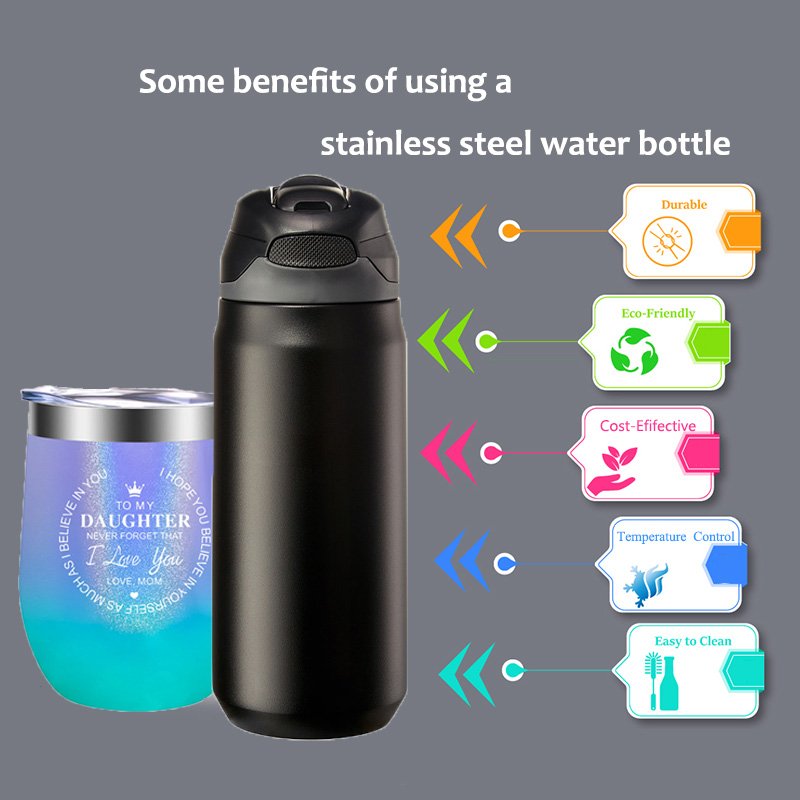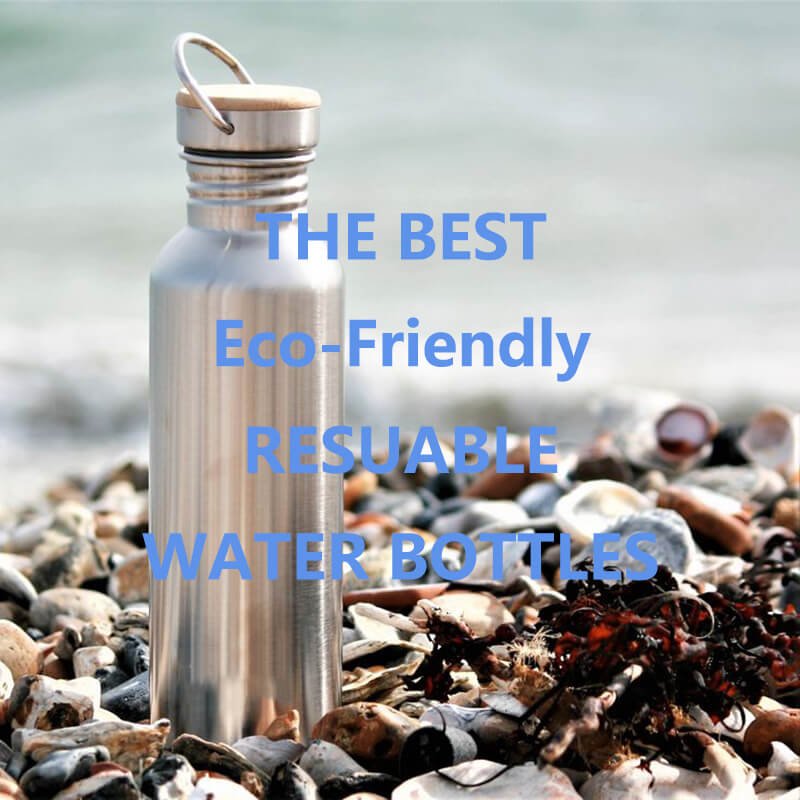The Importance of Choosing Reusable Items
The rise in the consumption of single-use cups and bottles has had a profound environmental impact, contributing significantly to global plastic pollution. According to estimates, millions of tons of plastic are discarded annually, much of which originates from common items like water bottles and coffee cups. These single-use products are designed to be used for only a short time, but their manufacturing process requires substantial natural resources, including water, fossil fuels, and energy. The production and disposal of these items not only deplete our planet’s resources but also result in harmful emissions and waste that contaminate our ecosystems.
Transitioning to reusable cups and bottles presents a myriad of benefits, significantly contributing to a more sustainable lifestyle. Firstly, the use of reusable items dramatically reduces the volume of waste that ends up in our landfills and oceans. This reduction is crucial for mitigating the plastic pollution crisis that poses a threat to wildlife and natural habitats. Secondly, reusable options are often constructed from more durable materials, which not only last longer but also consume fewer resources in the long run. When individuals opt for stainless steel, glass, or sturdy plastic containers, they make a commitment to conserve the Earth’s resources while enjoying high-quality products.
Moreover, adopting reusable cups and bottles promotes greater awareness of resource conservation and personal health. Using your own containers minimizes exposure to harmful chemicals found in some single-use plastics, providing a safer option for both beverages and food. This conscious choice supports a lifestyle that values the environment and influences others to consider similar changes. By prioritizing reusable items, individuals contribute to a shift towards sustainable consumer habits that can have lasting positive effects on both personal health and the planet.
Top Features to Look for in Reusable Cups and Bottles
When shopping for reusable cups and bottles, consumers should consider several critical features that enhance both functionality and sustainability. First and foremost, the material of the product plays a pivotal role in its performance and environmental impact. Popular options include stainless steel, which offers durability and excellent temperature retention; glass, known for being non-toxic and aesthetically pleasing; and BPA-free plastic for those seeking lightweight and shatter-resistant alternatives. Each material presents its unique advantages and potential drawbacks, making it essential to assess personal preferences and needs.
Another important consideration is size and capacity. Reusable cups and bottles come in various volumes, catering to different activities and individual preferences. A fitness enthusiast might prefer a larger capacity to stay hydrated during workouts, while a commuter may opt for a compact size that fits easily in a bag or cup holder. Selecting the right size ensures that the user’s hydration demands are met without compromising convenience.
Ease of cleaning is also a crucial factor, as this directly affects usability and hygiene. Many consumers should seek products that are dishwasher-safe or designed with wide openings that facilitate thorough cleaning. Additionally, features like removable components can enhance this aspect, allowing users to maintain their reusable products effectively over time.
Insulation properties are significant for maintaining beverage temperatures, especially for individuals frequently on the go. Double-walled designs can keep drinks hot or cold for extended periods, which can significantly enhance the user experience. Lastly, the design aesthetics of reusable cups and bottles should not be overlooked. Personal style and preference can encourage consistent use, reinforcing a commitment to sustainability. Ensuring that chosen products are durable and fit an individual’s lifestyle—whether for travel, fitness, or daily use—will greatly contribute to a successful transition towards a more sustainable way of living.
Our Top Recommendations for Reusable Cups and Bottles
In the quest for a sustainable lifestyle, selecting the right reusable cups and bottles can make a significant difference. Here, we present a curated list of our top recommendations, designed to meet diverse preferences and budgets while promoting environmental responsibility.
Firstly, the Hydro Flask Wide Mouth Bottle stands out for its exceptional insulation capabilities, keeping beverages hot for up to 12 hours and cold for 24 hours. Made from 18/8 stainless steel, this bottle is not only durable but also resistant to flavor transfer, making it perfect for various drinks. Its wide mouth allows for easy filling, pouring, and cleaning, while the wide array of colors appeals to different personal styles.
Next, consider the KeepCup Brew, a stylish and versatile reusable cup. This cup is designed for coffee lovers and fits most standard coffee machine sizes. It’s made from tempered glass, providing a unique aesthetic and retaining the taste profile of your beverage. Additionally, the silicone band offers a comfortable grip, and the cup is completely recyclable, signifying its eco-friendly nature.
For those who prefer a collapsible option, the Nomader Collapsible Water Bottle is an excellent choice. This bottle is made from lightweight silicone, making it easy to pack and transport. The Nomader bottle maintains a leak-proof design when expanded, and it can be easily rolled up when empty, making it ideal for travel and outdoor activities. It’s BPA-free and dishwasher safe, ensuring both safety and convenience.
Lastly, the EcoVessel Perk Insulated Coffee Tumbler deserves mention for its sustainable design and versatility. This tumbler is made from recycled materials and features a double-walled vacuum insulation, keeping drinks hot or cold for hours. The removable infuser allows for tea lovers to brew directly in the tumbler, enhancing its functionality and making it suitable for various beverages.
Each of these products offers unique features that cater to different lifestyles and preferences. By choosing any of these top recommendations, consumers can contribute to a more sustainable future while enjoying their favorite drinks in style.
Tips for Incorporating Reusable Cups and Bottles into Your Daily Routine
Integrating reusable cups and bottles into your everyday life is essential for fostering a sustainable lifestyle. One practical approach is to set reminders for yourself when leaving home. Utilizing phone alarms or sticky notes placed near your exit can effectively prompt you to grab your reusable items, ensuring that you have them ready for your daily errands, work, or social engagements.
Another helpful strategy is to designate specific storage spots for your reusable cups and bottles. For instance, keeping them in a visible area in the kitchen or in your car can significantly reduce the likelihood of forgetting them. Consider having a dedicated shelf in your kitchen or a tote bag in your vehicle where you can store your reusable items, ready to be taken whenever you head out. This not only enhances accessibility but also instills a routine that makes eco-conscious choices easier.
Moreover, exploring alternative uses for your reusable cups and bottles can maximize their utility. For example, a sturdy reusable bottle can serve as a water container for your plants or a measuring cup for cooking. Reusable coffee cups may double as storage for small items in your car or office. Such versatility can motivate you and others around you to embrace these sustainable options without feeling restricted to their initial purpose.
Encouraging friends and family to join you in making the switch to reusable cups and bottles can amplify the effort toward sustainability. Share your experiences and the benefits you have witnessed since making the transition. You might host informative gatherings or participate in community events that focus on sustainable practices, inspiring others to adopt reusable options themselves. Building a supportive community around sustainability fosters a collective commitment to reducing waste and protecting the environment.




маркетплейс аккаунтов соцсетей https://birzha-akkauntov-online.ru/
площадка для продажи аккаунтов маркетплейс для реселлеров
аккаунты с балансом маркетплейс аккаунтов соцсетей
гарантия при продаже аккаунтов https://ploshadka-prodazha-akkauntov.ru
аккаунты с балансом маркетплейс аккаунтов
купить аккаунт https://kupit-akkaunt-top.ru/
площадка для продажи аккаунтов маркетплейс аккаунтов
Account Catalog Account market
Accounts for Sale Account Sale
Account Catalog Accounts market
Marketplace for Ready-Made Accounts Database of Accounts for Sale
Database of Accounts for Sale Account Acquisition
Accounts market Gaming account marketplace
Profitable Account Sales Buy Pre-made Account
Sell Account Secure Account Purchasing Platform
Account Selling Service Buy accounts
Ready-Made Accounts for Sale Account Trading Platform
buy and sell accounts account marketplace
account trading platform sell pre-made account
purchase ready-made accounts secure account purchasing platform
account store sell account
gaming account marketplace buy pre-made account
sell account account buying service
sell account purchase ready-made accounts
account marketplace online account store
account exchange account store
social media account marketplace accounts marketplace
accounts market verified accounts for sale
account buying platform account catalog
account market sell account
account trading platform sell accounts
secure account sales accounts marketplace
buy accounts gaming account marketplace
website for selling accounts sell pre-made account
profitable account sales account exchange
find accounts for sale purchase ready-made accounts
buy accounts website for buying accounts
accounts for sale account marketplace
account trading platform buy pre-made account
secure account sales account exchange service
secure account sales https://accounts-store.org
account trading service profitable account sales
gaming account marketplace profitable account sales
online account store accounts marketplace
buy pre-made account account marketplace
account marketplace https://accounts-marketplace.xyz
website for buying accounts accounts market
sell pre-made account account market
account market https://accounts-marketplace.live/
account marketplace https://social-accounts-marketplace.xyz
verified accounts for sale buy accounts
database of accounts for sale https://buy-accounts-shop.pro/
account buying service accounts marketplace
account trading platform https://social-accounts-marketplace.live
account trading platform https://accounts-marketplace.online
secure account purchasing platform https://accounts-marketplace-best.pro/
купить аккаунт https://akkaunty-na-prodazhu.pro/
площадка для продажи аккаунтов купить аккаунт
продажа аккаунтов https://kupit-akkaunt.xyz
маркетплейс аккаунтов соцсетей https://akkaunt-magazin.online/
продажа аккаунтов https://akkaunty-market.live
маркетплейс аккаунтов https://kupit-akkaunty-market.xyz/
маркетплейс аккаунтов соцсетей https://akkaunty-optom.live/
купить аккаунт https://online-akkaunty-magazin.xyz
маркетплейс аккаунтов https://akkaunty-dlya-prodazhi.pro
маркетплейс аккаунтов https://kupit-akkaunt.online
buy accounts facebook https://buy-adsaccounts.work/
buy fb account https://buy-ad-accounts.click
buy facebook accounts for advertising buy facebook accounts for ads
buy a facebook account buy facebook account
buy facebook advertising buy facebook accounts for advertising
buy facebook accounts for ads https://buy-ads-account.work
facebook ad account buy https://ad-account-for-sale.top
buying fb accounts https://buy-ad-account.click
fb account for sale https://ad-accounts-for-sale.work
buy verified google ads account buy google ad account
buy google agency account https://buy-ads-accounts.click
facebook accounts for sale buy facebook accounts cheap
buy adwords account buy google adwords accounts
buy google ads verified account buy old google ads account
buy google adwords accounts https://buy-ads-invoice-account.top/
buy google ads verified account https://buy-account-ads.work
buy google ad account https://buy-ads-agency-account.top/
google ads account seller google ads accounts
google ads account seller https://ads-agency-account-buy.click
buy verified facebook business manager account https://buy-business-manager.org
google ads account seller buy aged google ads accounts
facebook business manager buy https://buy-bm-account.org
buy facebook business manager accounts https://buy-business-manager-acc.org
buy verified bm https://buy-verified-business-manager-account.org
buy business manager account https://buy-verified-business-manager.org
buy facebook business account business-manager-for-sale.org
buy verified business manager facebook buy-business-manager-verified.org
buy facebook bm https://buy-bm.org
buy facebook business manager https://verified-business-manager-for-sale.org
verified bm for sale https://buy-business-manager-accounts.org/
buy tiktok business account buy tiktok ads
tiktok ads agency account https://tiktok-ads-account-buy.org
buy tiktok ads accounts https://tiktok-ads-account-for-sale.org
tiktok ads account for sale https://tiktok-agency-account-for-sale.org
buy tiktok business account https://buy-tiktok-ad-account.org
buy tiktok ads https://buy-tiktok-ads-accounts.org
buy tiktok ads https://tiktok-ads-agency-account.org
tiktok ads account for sale https://buy-tiktok-business-account.org
buy tiktok ads https://buy-tiktok-ads.org
buy facebook profiles buy accounts account market
buy fb ad account buy and sell accounts sell accounts